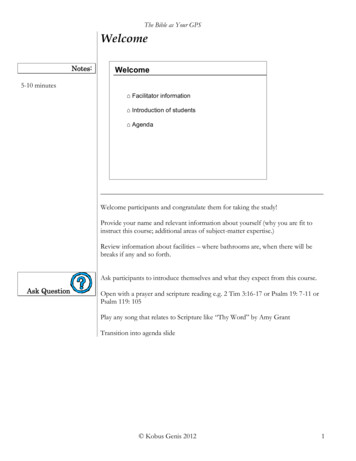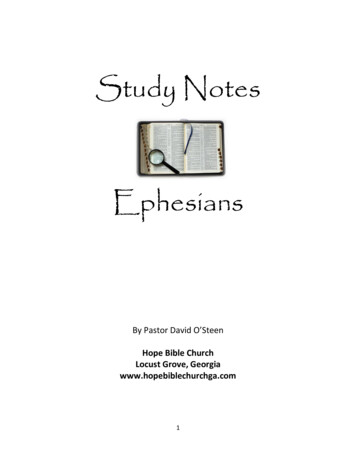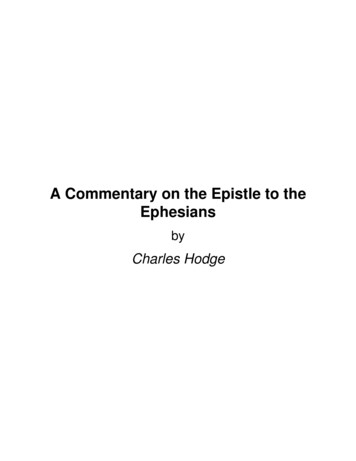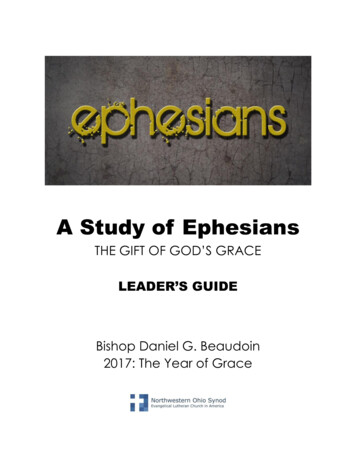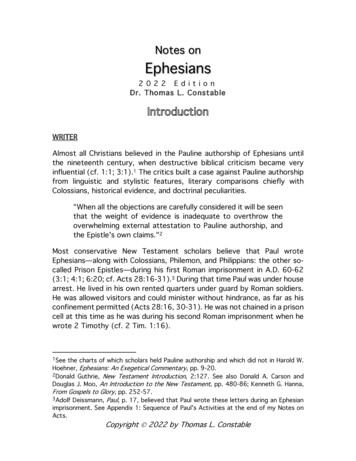
Transcription
Notes onEphesians2 0 2 2 E d i t i o nDr. Thomas L. ConstableWRITERAlmost all Christians believed in the Pauline authorship of Ephesians untilthe nineteenth century, when destructive biblical criticism became veryinfluential (cf. 1:1; 3:1).1 The critics built a case against Pauline authorshipfrom linguistic and stylistic features, literary comparisons chiefly withColossians, historical evidence, and doctrinal peculiarities."When all the objections are carefully considered it will be seenthat the weight of evidence is inadequate to overthrow theoverwhelming external attestation to Pauline authorship, andthe Epistle's own claims."2Most conservative New Testament scholars believe that Paul wroteEphesians—along with Colossians, Philemon, and Philippians: the other socalled Prison Epistles—during his first Roman imprisonment in A.D. 60-62(3:1; 4:1; 6:20; cf. Acts 28:16-31).3 During that time Paul was under housearrest. He lived in his own rented quarters under guard by Roman soldiers.He was allowed visitors and could minister without hindrance, as far as hisconfinement permitted (Acts 28:16, 30-31). He was not chained in a prisoncell at this time as he was during his second Roman imprisonment when hewrote 2 Timothy (cf. 2 Tim. 1:16).1Seethe charts of which scholars held Pauline authorship and which did not in Harold W.Hoehner, Ephesians: An Exegetical Commentary, pp. 9-20.2Donald Guthrie, New Testament Introduction, 2:127. See also Donald A. Carson andDouglas J. Moo, An Introduction to the New Testament, pp. 480-86; Kenneth G. Hanna,From Gospels to Glory, pp. 252-57.3Adolf Deissmann, Paul, p. 17, believed that Paul wrote these letters during an Ephesianimprisonment. See Appendix 1: Sequence of Paul's Activities at the end of my Notes onActs.Copyright Ó 2022 by Thomas L. Constable
2Dr. Constable's Notes on Ephesians2022 EditionDATEFor some interpreters the reference to Paul having recently sent Tychicusto Ephesus (2 Tim. 4:12) seems to put the composition of Ephesians in thesecond imprisonment (cf. Eph. 6:21-22). However the similarities betweenEphesians and Colossians have led most scholars to conclude that Paulwrote these two letters at nearly the same time.1 The evidence for hishaving written Colossians and Philemon during the first imprisonment isstrong.1Seecharts of comparisons of Ephesians and Colossians in Hoehner, p. 34; John Eadie,Commentary on the Epistle to the Ephesians, p. xlvii; and William Hendriksen, NewTestament Commentary: Exposition of Ephesians, pp. 5-32.
2022 EditionDr. Constable's Notes on Ephesians3"Ephesians bears much the same relation to Colossians thatRomans does to Galatians, a fuller treatment of the samegeneral theme in a more detached and impersonal manner."1Some scholars believe that Paul wrote Colossians before Ephesians.2 Asignificant difference between these very similar epistles is that inColossians Paul was combating a false doctrine concerning Christ. But inEphesians he did not address a particular problem or situation thatoccasioned that epistle.3Paul knew Ephesus and the church in that city very well. He had ministeredin Asia Minor, the Roman province of which Ephesus was the capital, withEphesus as his headquarters, for about three years: A.D. 53-56 (Acts19:1—20:1). It appears that he sent this epistle to the Ephesian church sothat the Christians there would subsequently circulate it among the otherchurches.4 At least two other New Testament books went first to Ephesus:1 and 2 Timothy. John's Gospel, his three epistles, and the Book ofRevelation probably did as well (cf. Rev. 2:1). Tychicus evidently deliveredthis epistle to the Ephesian church (Eph. 6:21-22).PURPOSEPaul's frequent references to the church as a mystery (divine secret),previously unknown but now revealed, identify the apostle's main purposein writing as having been the exposition of the mystery of the church (1:9;3:3-4, 9; 5:32; 6:19). His emphasis on the church as Christ's body, in whichboth Jewish and Gentile believers are one, suggests that Paul wrote in orderto promote unity in the Ephesian church and in all other churches. Theemphasis on the importance of love is also strong.5 More than one-sixth ofPaul's references to love in his 13 epistles occur in Ephesians. This alsoshows that he wanted to promote Christian unity in the church.1A.T. Robertson, Word Pictures in the New Testament, 4:514.Eadie, p. xlviii; Robert Jamieson, A. R. Fausset, and David Brown, CommentaryPractical and Explanatory on the Whole Bible, p. 1278; Robertson, 4:514.3See Eadie, p. xlvii.4See my comments on 1:1.5See Hoehner, pp. 104-6.2E.g.
Dr. Constable's Notes on Ephesians42022 Edition"Possibly realizing that the Ephesians were starting to forsaketheir first love, Paul wrote this letter to encourage them tolove both God and their fellow saints more deeply."1"The letter focuses on what God did through the historicalwork of Jesus Christ and does through his Spirit today, in orderto build his new society in the midst of the old."2EMPHASESIn addition to the church and love, Ephesians emphasizes God's action indecreeing (planning) and providing salvation, the importance of theChristian's growth in knowledge, the importance of living out one's faithconsistently, and spiritual warfare. Ephesians is one of the most well-lovedof Paul's epistles because it is both very important doctrinally andextremely practical.Norman B. Harrison considered Ephesians, Philippians, and Colossians aswritten to the spiritual man, 1 and 2 Corinthians and Galatians as writtento the carnal man, and Romans as written to the natural man.3GENREThough the general genre (literary type) of Ephesians is a letter, it is not aletter in the same form as most of Paul's other letters. There is no evidencein Ephesians that Paul wrote it in order to respond to a particular situation;it is not an "occasional" epistle. In this it is similar to Romans. Both of theseepistles are more like public speeches than private monologues."He [the writer] is meditating, and developing certainthoughts—and clothes them in the form of a letter."41Ibid.,p. 106. Cf. Rev. 2:4.R. W. Stott, The Message of Ephesians, p. 24.3Norman B. Harrison, His Very Own, p. 9.4Willi Marxsen, Introduction to the New Testament, p. 192.2John
2022 EditionDr. Constable's Notes on Ephesians5OUTLINEI.II.Salutation 1:1-2The Christian's calling 1:3—3:21A.Individual calling 1:3—2:101.2.3.B.Corporate calling 2:11-3:191.2.3.C.III.Present unity 2:11-22Past ignorance 3:1-13Future comprehension 3:14-19Doxology 3:20-21The Christian's conduct 4:1—6:20A.Spiritual walk 4:1—6:91.2.3.4.5.B.IV.The purpose: glory 1:3-14The means: knowledge 1:15-23The motive: grace nunity 4:1-16holiness 4:17-32love 5:1-6light 5:7-14wisdom 5:15—6:9Spiritual warfare 6:10-20Conclusion 6:21-24MESSAGEThe Book of Ephesians enables us to view God's creation from an alpinealtitude. When we study this book it is as though we have climbed a highmountain peak, because the book gives us that kind of perspective on whatGod has created. Recall the opening scenes in "The Sound of Music" movie,where Maria Von Trapp is standing in a high meadow looking out over thevalleys and mountains beyond. Yet the "creation" that Ephesians opens upto our vision is not the physical creation, but the church and its position
6Dr. Constable's Notes on Ephesians2022 Editionand importance in the panorama of God's program for humankind. Thechurch is the subject of Ephesians. The church began on the Day ofPentecost, and it will end at the Rapture.One of the features of this book that distinguishes it from other Paulineepistles is its universal character. Ephesians deals with matters ofperspective that are important to all churches of all periods of churchhistory. Ephesians is not like 1 Corinthians, which concerns itself primarilywith the situation of one local congregation. It is more like Romans, whichdeals with the great revelations that transcend local church polity.Ephesians is an exposition of one of the most important statements thatJesus ever uttered during His earthly ministry. That statement is inMatthew 16:18: "I will build My church; and the gates of Hades will notoverpower it."1 Various epistles similarly expound other teachings thatJesus gave while He walked this earth. For example, the Epistle of James isan exposition of Jesus' Sermon on the Mount. John's first epistle is anexposition of Jesus' Upper Room Discourse. Likewise, Ephesians explainsJesus' teaching concerning the church. All the New Testament epistles dealwith the church, of course, but Ephesians lifts us above all the otherrevelation on this subject and puts the church in perspective within theplan of God. Paul developed both the building of the church and the conflictof the church, which are suggested in Jesus' statement, in Ephesians.Paul introduced the central teaching of Ephesians in its first verse. We read,"To the saints in Christ Jesus." This phrase indicates the composition ofthe church, and it alerts us to what will follow in the epistle. The phrase"the saints" (individual believers) reflects the diversity and differences thatexist within the church. Paul had much to say in this letter about God'sindividual blessing of believers (e.g., 1:3—2:10). However the phrase "inChrist Jesus" emphasizes the unification of these individuals in one unitedchurch. Paul also had much to say about the corporate calling of believersin this letter (e.g., 2:11—3:19). The church is one organism that God hascreated from individual believers in this age, believers whom God has unitedin a vital relationship with Jesus Christ. The figure of the human body, withits diverse members controlled by one head (2:14-16), is a wonderfulillustration of the church.1Quotationsfrom the English Bible in these notes are from the New American StandardBible (NASB), 2020 edition, unless otherwise indicated.
2022 EditionDr. Constable's Notes on Ephesians7As we examine the central teaching in Ephesians we can see that it fallsinto two parts. First, there is revelation concerning the eternal character ofthe church. Second, there is teaching about the temporal conduct of thechurch.Consider first the revelation concerning the eternal character of the church.Ephesians tells us three things about the character of the church:First, it reveals its conception. The church was in the plan of God frometernity past. It was not something that God thought up on the day thatJesus Christ died because the Jews had rejected their Messiah. Somedispensational expositors have referred to the church as a parentheticalpart of God's eternal plan. That does not mean that the church was anafterthought by God. The church is just as much a part of God's eternalplan for human history as the nation of Israel. God did not reveal the churchin the Old Testament. It was a mystery, a New Testament revelation notpreviously revealed. Nevertheless it was always part of God's plan. This isimportant for us to realize because, when we see that God brought thechurch into existence, it is easier to believe that Satan will never destroythe church.The second thing that Ephesians reveals about the eternal character of thechurch is its construction. Whereas God viewed the church in the past aspart of His eternal plan, He is constructing it in the present by His eternalpower. In Ephesians there is much emphasis on power, the tremendouspower of God. Paul prayed that his readers would grow in theirunderstanding of the eternal power of God, the power that raised Jesusfrom the grave (1:18-19). Paul used four different Greek words for powerin 1:19. This "resurrection power" is the same power that has raised theChristian up and seated him or her with Christ in the heavenly realms now(2:4-6). It is also the same power that is available to us Christians as weengage our spiritual enemy who is trying to tear down the church (6:1011). Too often Christians fail because they think the church cannotsucceed. They fail to appreciate the eternal divine power presently availableto build the church and to defeat its foes.The third thing that we learn from this epistle about the character of thechurch is its consummation. This too involves an eternal perspective.Ephesians reveals that the church will serve the purpose of God throughouteternity future (2:4-7; 3:8-10). The church will demonstrate the richness
8Dr. Constable's Notes on Ephesians2022 Editionof God's grace to all beings forever (2:7). It will also demonstrate therichness of God's wisdom to all beings forever (3:10).In summary, Ephesians reveals the important place that the church has inGod's eternal plan for history. In the past He conceived of it as part of Hiseternal plan. In the present He is constructing it with His eternal power. Inthe future He will bring it to consummation in fulfillment of His eternalpurpose.Whereas the revelation of the church's eternal character constitutes amajor portion of this epistle, Paul also taught much about the temporalconduct of the church. The church's eternal character has majorimplications for its temporal conduct (4:1). We can organize this part ofthe revelation under three headings as well:The first implication of the character of the church that Paul stressedrelates to its construction. Since the church is what it is, the unified bodyof Christ, it is very important that Christians preserve this unity (4:1-3).Note that this is not a unity among professing Christians that we mustachieve. It is a unity among genuine Christians that we must preserve. Wemust be very careful to avoid causing divisions in the body of Christ. Oneof the seven things that Solomon wrote that God hates is someone whospreads strife among his brothers and thus causes disunity (Prov. 6:19).A second implication of the character of the church relates to itsconfession. The church, Paul urged, must make a confession, or givetestimony, to God. This is the will of God (5:15-17). Christians do this bysanctifying all of life to God: setting it apart to Him for His honor and glory.Consequently Paul talked about the basic relationships of life: husbands andwives, parents and children, employers and employees. Our faith must havean impact on these relationships. The church makes its confession beforethe world, not primarily by formulating creeds of belief, but bydemonstrating sanctification in conduct.Third, another implication of the character of the church that Paul explainedrelates to its conflict with the forces opposed to God's purposes. Christiansmust arm themselves, stay alert, and take a stand against these spiritualforces (6:10-11).To summarize, the church must maintain unity as it grows. It must sanctifyevery relationship as it makes its confession to the world. And it must stand
2022 EditionDr. Constable's Notes on Ephesians9firm against its spiritual enemies as it conflicts with Satan's forces. Thesepoints clarify Matthew 16:18: "I will build my church; and the gates ofHades will not overpower it." The church cooperates with God as He buildsit in three ways: First, it must remain united itself. Second, it must presenta message of purity and holiness to the world by its sanctified relationships.And third, it must fight God's enemies after putting on the whole armor ofGod.Attempting to summarize the teaching of Ephesians into a short messagestatement I would phrase it this way: Ephesians reveals that the church ispart of God's eternal plan, and it grows as a result of God's power workingthrough believers' lives as they overcome their spiritual enemies.What is the abiding appeal that this letter contains? I previously said thatPaul summarized the central revelation of Ephesians in 1:1: "the saints in Christ Jesus." Similarly he summarized the timeless exhortation of thisletter in 4:1: "Walk in a manner worthy of the calling with which you havebeen called."First, Christians are to walk in view of God's eternal plan. That is, we shouldlive now with the knowledge of God's purposes throughout eternity clearlyin view. God chose believers before the creation of the world so that Hecould conform us to the image of His Son (1:4; Rom. 8:29). We are to"grow up in all aspects into Him who is the head, that is, Christ" (4:15).The extent to which we are living in holiness and in love is the extent towhich we are conforming to God's eternal plan. Paul did not tell us to beholy because decency demands it, or because God may discipline us if wedo not. We are to live thinking about God's eternal plan and rememberingthat God had our individual lives in His mind from eternity past. ReadingScripture regularly is one way to remind ourselves of this.Second, we can walk according to God's plan only by appropriating Hisalmighty power. God is able to enable us to walk in this plan by His power.He is able to do beyond what we ask or think (3:20-21). We have the powerto walk worthily because the Holy Spirit indwells us. However we must allowGod's Spirit to control us if we want to walk in harmony with God's will(5:18). This involves consciously yielding control to Him (cf. Rom. 6:13).Third, we are to walk opposing God's unseen enemies. We need to balancethe passive "be filled with the Spirit" (5:18) with the active "Stand firm"(6:14). Our enemies are not primarily other people but the unseen demonic
Dr. Constable's Notes on Ephesians102022 Editionpersonalities behind them. In former years many people scoffed at the ideaof demons and malignant spiritual forces. Today there is a more realisticawareness of their existence and powerful influence in the world. We mustengage spiritual enemies with spiritual weapons: truthfulness, righteousconduct, the gospel, trust in God, the Word of God appropriate to the need,and prayer (6:14-18).The measure of the church's power to change the world is the measure ofher other-worldliness. Many in our day criticize the church for beinguninvolved, or at least not involved enough, with the physical problems ofpeople. Ephesians teaches us that the way to help people the most is bydealing with unseen issues: unity, love, holiness, prayer, and evangelism.We do the church's work much more effectively by praying than bypicketing, protesting, or politicking. The measure of the church's power tohelp the world is the measure of her other-worldliness. The church mustremember her heavenly calling in the eternal plan of God in order to realizeall that God intends for her."The church of God can never help God when she ceases to beother-worldly. When she is other-worldly she helps the world;and cannot avoid doing so."1Conversely the measure of the church's other-worldliness is the measureof her influence in the world. If we really see God's intent for the church wecan never remain unconcerned about or uninvolved with the physicalproblems of people. Was our Lord insensitive to suffering, unconcernedabout injustice, or lacking in compassion toward the oppressed? Never. AndHe is the Head into whom we are to grow up.21G.Campbell Morgan, Living Messages of the Books of the Bible, 2:1:183.from ibid., 2:1:167-84.2Adapted
2022 EditionI.Dr. Constable's Notes on Ephesians11SALUTATION 1:1-2In many of his epistles Paul began by setting forth foundational truth. Hethen concluded by applying that truth to the lives of his readers. Thispattern is very obvious in Ephesians where the first three chapters dealwith doctrine (teaching), and the last three with practice (application). Ofcourse there is some doctrine in the last three chapters and someapplication in the first three, but generally this is how Paul organized hismaterial. Compare the Book of Romans, in which chapters 1—11 containmainly doctrine and chapters 12—16 mostly practice.The salutation contains Paul's introduction of himself to the originalrecipients of this letter and his greeting to them.1:1Paul referred to himself by name twice as the writer of thisbook (cf. 3:1). The only other epistle to a church that Paulwrote as the sole writer—without reference to a fellow-writeror writers—was Romans. Even though some critics have deniedthe Pauline authorship of Ephesians—largely because of thevocabulary, style, and doctrine it contains—the early churchaccepted it without dispute.1"Ephesians, then, was unhesitatingly assigned toPaul from the time when the New Testamentcorpus began to be recognized as such in the midsecond century. Since Clement of Rome reflectedits language when he wrote to Corinth in A.D. 95,it is likely that this attestation runs back to thefirst century."2The New Testament writers used the word apostle (lit. sentone) in either a general or in a particular sense. Sometimes itrefers generally to anyone sent out as a representative ofJesus Christ (Acts 14:4, 14 [Barnabas]; 2 Cor. 8:23 [Titus];Phil. 2:25 [Epaphroditus]). A modern equivalent would be a1W.G. Kummel, Introduction to the New Testament, p. 357.Skevington Wood, "Ephesians," in Ephesians-Philemon, vol. 11 of The Expositor's BibleCommentary, p. 4.2A.
Dr. Constable's Notes on Ephesians122022 Editionmissionary. Usually it refers to one of the 12 apostles or Paulwho saw the risen Christ, as it does here. The Lord Jesuscommissioned and sent Paul out with the gospel message. Paulreceived his apostleship on the Damascus Road because ofGod's will or decision, not his own choosing (Acts 26:16-18).He referred to his apostleship here in order to underline thetruthfulness and claims of the following chapters.1The original recipients of this epistle were saints (Gr. hagiois,holy ones): people set apart by God for His use. They lived inEphesus, which was the capital of the Roman province of Asia,where Paul had ministered for three years during his thirdmissionary journey (Acts 20:31).The words "at Ephesus" or "in Ephesus" do not appear in threeearly Alexandrian (Egyptian) manuscripts. This omission hasled some scholars to conclude that Paul originally sent thisepistle to several undesignated local churches, probably in theprovince of Asia, for the recipients to circulate among them.Advocates of this view have pointed to the absence of anyreference to individuals as evidence that Paul meant it to goto several churches rather than just to the Ephesian church.However it seems best to regard the Ephesian church as theoriginal audience for the following reasons: Most ancientmanuscripts do contain the words "at Ephesus" or "inEphesus." Moreover, no manuscript contains the name of anyother city or even the Greek words translated "at" or "in."Furthermore, all of Paul's other inspired epistles mention therecipients.2Perhaps Paul omitted personal names of Ephesian believers inthis epistle because he felt no need to greet them since thisletter would circulate to other churches as well. Anotherpossible reason may be that if he had named believers, hewould have had to mention many, since he knew so manypeople in the Ephesian church.1Eadie,2Seep. 1.Hanna, pp. 257-58, for further discussion.
2022 EditionDr. Constable's Notes on Ephesians13It is quite possible that Paul intended Ephesians to be anencyclical letter (a letter to be circulated among manychurches). All the New Testament writings circulated amongthe churches, and Paul may have written Ephesians with this inview (cf. Col. 4:16). Since Ephesus was a strategic city in boththe Roman Empire and in Paul's ministry, it would have beennatural for him to send this letter to that city first.Not all saints are "faithful" (2 Tim. 2:13), but the majority ofthe Ephesian believers were. They had been holding fast to theteaching that they had received when Paul wrote this epistle(cf. Acts 20:28-32; Rev. 2:1-7)."In Christ" describes all who are saints. Every believer occupiesa location in space. These saints were in Ephesus. Howeverevery Christian saint also lives within the sphere of God's familybecause of Jesus' saving work, which Paul spoke of as being"in Christ." This phrase was a favorite of Paul's. He used it ninetimes in 1:1-14 and about 27 times in this epistle. It occursapproximately 130 times in the New Testament. Much of whatfollows in chapters 1—3 is an explanation of what it means tobe "in Christ.""Thus our being in Christ means that the LordJesus surrounds and embraces the believer in Hisown life, and separates him at the same time fromall outside and hostile influences. He protects thebeliever from all perils and foes, and supplies himwith all that is necessary. In Ephesians themeaning of this being 'in Christ' reaches itshighest thought. The peculiar truth in Ephesians isthe heavenly nature and divine fullness of thissphere of our new life."11AugustVan Ryn, Ephesians: The Glory of His Grace, p. 17. See also A. J. M. Wedderburn,"Some Observations on Paul's Use of the Phrases 'In Christ' and 'With Christ'," Journal forthe Study of the New Testament 25 (October 1985):83-97.
14Dr. Constable's Notes on Ephesians2022 Edition"That phrase in Christ strikes the keynote of theentire Epistle; from that prolific germ ramifies thebranching oak of the forest."11:2Paul greeted his readers by wishing God's grace and peace onthem, as he did in all of his other epistles. Grace (Gr. charis)expresses God's unmerited favor and divine enablement, whichare the portion of every saint. Peace (Gr. eirene, whichtranslates the Hebrew shalom) is our condition resulting fromGod's grace to us. We have peace with God, and we canexperience the peace of God—the fullness of His blessing—because of His grace (cf. Num. 6:25-26)."So if we want a concise summary of the goodnews which the whole letter announces, we couldnot find a better one than the three monosyllables'peace through grace'."2"To the receivers of grace and peace God is in therelation of Father; to the same subjects Christ isin the relation of Lord. God is Father, having madethem His children by adoption. Christ is Lord,being constituted Head of the Church and havingwon the right to their loving obedience and honour "3"The words 'to the Saints and to the faithful inChrist Jesus' correspond to the two divisions ofthe epistle. In the first three chapters we learnthat God has made us His Saints in Christ; in thelast three chapters we are exhorted to walk inobedience and be faithful."41E.K. Simpson, Commentary on the Epistle to the Ephesians, in Commentary on theEpistles to the Ephesians and the Colossians, p. 24.2Stott,p. 28.D. F. Salmond, "The Epistle to the Ephesians," in The Expositor's Greek Testament,3:244.4Arno C. Gaebelein, The Annotated Bible, 3:2:238.3S.
2022 EditionII.Dr. Constable's Notes on Ephesians15THE CHRISTIAN'S CALLING 1:3—3:21" the first three chapters are one long prayer, culminating inthe great doxology at the end of chapter 3. There is in factnothing like this in all Paul's letters. This is the language oflyrical prayer, not the language of argument, and controversy,and rebuke."1A.INDIVIDUAL CALLING 1:3—2:10Paul began the body of his letter by revealing the spiritual blessings thatGod has planned for all believers in His Son."The opening section of Ephesians (1:3—2:10), whichdescribes the new life God has given us in Christ, divides itselfnaturally into two halves, the first consisting of praise and thesecond of prayer. In the 'praise' half Paul blesses God that hehas blessed us in Christ with every spiritual blessing (1:3-14),while in the 'prayer' half he asks that God will open our eyesto grasp the fullness of this blessing (1:15—2:10)."21.The purpose: glory 1:3-14In the Greek text verses 3-14 are one sentence. The Holy Spirit carried Paulalong in his thinking as he contemplated God's provision so that he movedquickly from one blessing to the next. It is as though he was ecstaticallyopening a treasure chest, lifting its jewels with his hands, letting themcascade through his fingers, and marveling briefly at them as they caughthis eye."Each section ends with a note of praise for God (vv. 6, 11,14), focusing on a different member of the Trinity. After anopening summary of all the saints' spiritual blessings (v. 3),the first section (vv. 4-6) offers up praise that the Father haschosen us in eternity past; the second section (vv. 7-11)offers up praise that the Son has redeemed us in the historicalpast (i.e., at the cross); the third section (vv. 12-14) offers1William2Stott,Barclay, The Letters to the Galatians and Ephesians, p. 76.p. 31.
16Dr. Constable's Notes on Ephesians2022 Editionup praise that the Holy Spirit has sealed us in our personal past,at the point of conversion."1"Normally, after the greeting Paul gives an introductorythanksgiving for the recipients of the letter. In this epistle hechanges the order, for before he gives his thanksgiving inverses 15-23, he has in verses 3-14 a paean [song] of praisefor what God has done for the believer."2" Ephesians 1:3-14 is one of the longest psalms of the NewTestament, and it is a praise psalm in its form."3The believer's position in Christ 1:3"This verse marks not only the introduction but also the mainsentence of the eulogy. It is in essence a summary of the wholeeulogy."4God is "blessed" (praised) because He "has blessed" believers. However,Christians should also bless or praise (Gr. eulogetos, speak well of) God theFather for bestowing these blessings."He makes us blessed, we pronounce Him blessed."5"When we bless God, we praise Him, speak well of Him. WhenHe blesses us, it is not that He speaks us good but He does usgood. Our blessing is in word. His is in deed. He confers benefitsupon us."6Paul was thinking of God as both the Father of believers ("our Father," v.2), and the Father of His Son ("Father of the Lord Jesus Christ," v. 3). Godhas already blessed believers in the ways that the apostle proceeded to1TheNET2 Bible note on 1:3. The NET2 Bible is The NET2 (New English Translation) Bible,2019 ed.2Hoehner, p. 153.3Darrell L. Bock, "A Theology of Paul's Prison Epistles," in A Biblical Theology of the NewTestament, p. 309. Cf. Luke 1:46-55 and 1:67-79.4Hoehner, p. 162. A eulogy is a speech
Bible (NASB), 2020 edition, unless otherwise indicated. 2022 Edition Dr. Constable's Notes on Ephesians 7 As we examine the central teaching in Ephesians we can see that it falls into two parts. First, there is revelation concerning the eternal character of the church. Second, there is teaching about the temporal conduct of the

